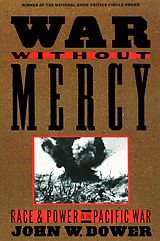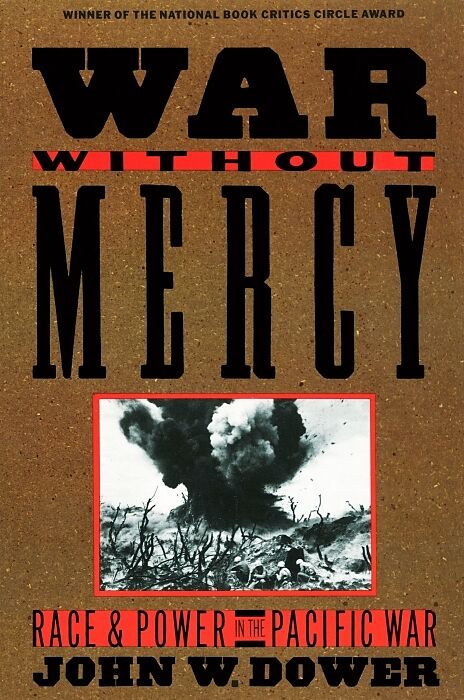War without Mercy
Einband:
Broschiert
EAN:
9780394751726
Untertitel:
Race and Power in the Pacific War (NATIONAL BOOK CRITICS CIRCLE AWARD WINNER)
Genre:
Übrige Sachbücher & Sonstiges
Autor:
John Dower
Herausgeber:
Random House N.Y.
Anzahl Seiten:
416
Erscheinungsdatum:
12.02.1987
ISBN:
0394751728
Zusatztext War Without Mercy has been widely praised in the press: May well be the most important study of the Pacific War ever published. The New Republic One of the handful of truly important books on the Pacific War . . . a cautionary tale for all peoples! now and in the future. Foreign Affairs An exceptionally important book. Newsweek Belongs in every general library . . . should be required reading for anyone interested in understanding the trade wars that have mercifully replaced the killing fields in the Pacific. The Boston Globe Informationen zum Autor JOHN W. DOWER, born in 1938, is the Henry Luce Professor of International Cooperation and Global Stability at the Massachusetts Institute of Technology. He is the author of Empire and Aftermath: Yoshida Shigeru and the Japanese Experience, 18781954 and The Elements of Japanese Design , and is the editor of The Origins of the Japanese State: Selected Writings of E. H. Norman and coeditor of The Hiroshima Murals: The Art of Iri Maruki and Toshi Maruki. Klappentext WINNER OF THE NATIONAL BOOK CRITICS CIRCLE AWARD AN AMERICAN BOOK AWARD FINALIST Now in paperback, War Without Mercy has been hailed by The New York Times as "one of the most original and important books to be written about the war between Japan and the United States." In this monumental history, Professor John Dower reveals a hidden, explosive dimension of the Pacific War-race-while writing what John Toland has called "a landmark book . . . a powerful, moving, and evenhanded history that is sorely needed in both America and Japan." Drawing on American and Japanese songs, slogans, cartoons, propaganda films, secret reports, and a wealth of other documents of the time, Dower opens up a whole new way of looking at that bitter struggle of four and a half decades ago and its ramifications in our lives today. As Edwin O. Reischauer, former ambassador to Japan, has pointed out, this book offers "a lesson that the postwar generations need most . . . with eloquence, crushing detail, and power." PREFACE Some five years ago, while drafting the opening chapter to a projected book about the occupation of Japan that followed World War Two, I found myself mentioning in passing the race hates and merciless fighting that had been so conspicuous in the war in Asia and the Pacific. One of the impressive features of the occupation, after all, was that the defeated Japanese and victorious Allies, predominantly Americans, worked together so amicably and constructively. War-crimes trials were conducted after Japan's surrender; reports of wartime atrocities preoccupied journalists and jurists for many months; and there was hardly a corner of Japanese society that was not subjected to critical scrutiny. The war hates themselves, however, seemed to disappear almost overnightso quickly, in fact, that they are easily forgotten now. In a world that continues to experience so much violence and racial hatred, such a dramatic transformation from bitter enmity to genuine cooperation is heartening, and thus the fading memories of the war pose a paradox. It is fortunate that people on all sides can put such a terrible conflict behind them, but dangerous to forget how easily war came about between Japan and the Western Allies, and how extraordinarily fierce and Manichaean it was. We can never hope to understand the nature of World War Two in Asia, or international and interracial conflict in general, if we fail to work constantly at correcting and re-creating the historical memory. At a more modest level, the significance of the occupation of Japan and postwar rapprochement between the Japanese and their former enemies can only be appreciated against the background of burning passions and unbridled violence that preceded Japan's surrender in August ...
War Without Mercy has been widely praised in the press:
“May well be the most important study of the Pacific War ever published.”
—The New Republic
“One of the handful of truly important books on the Pacific War . . . a cautionary tale for all peoples, now and in the future.”
—Foreign Affairs
“An exceptionally important book.”
—Newsweek
“Belongs in every general library . . . should be required reading for anyone interested in understanding the trade wars that have mercifully replaced the killing fields in the Pacific.”
—The Boston Globe
Autorentext
JOHN W. DOWER, born in 1938, is the Henry Luce Professor of International Cooperation and Global Stability at the Massachusetts Institute of Technology. He is the author of Empire and Aftermath: Yoshida Shigeru and the Japanese Experience, 1878–1954 and The Elements of Japanese Design, and is the editor of The Origins of the Japanese State: Selected Writings of E. H. Norman and coeditor of The Hiroshima Murals: The Art of Iri Maruki and Toshi Maruki.
Klappentext
WINNER OF THE NATIONAL BOOK CRITICS CIRCLE AWARD AN AMERICAN BOOK AWARD FINALIST Now in paperback, War Without Mercy has been hailed by The New York Times as "one of the most original and important books to be written about the war between Japan and the United States." In this monumental history, Professor John Dower reveals a hidden, explosive dimension of the Pacific War-race-while writing what John Toland has called "a landmark book . . . a powerful, moving, and evenhanded history that is sorely needed in both America and Japan." Drawing on American and Japanese songs, slogans, cartoons, propaganda films, secret reports, and a wealth of other documents of the time, Dower opens up a whole new way of looking at that bitter struggle of four and a half decades ago and its ramifications in our lives today. As Edwin O. Reischauer, former ambassador to Japan, has pointed out, this book offers "a lesson that the postwar generations need most . . . with eloquence, crushing detail, and power."
Zusammenfassung
WINNER OF THE NATIONAL BOOK CRITICS CIRCLE AWARD • AN AMERICAN BOOK AWARD FINALIST • A monumental history that has been hailed by The New York Times as “one of the most original and important books to be written about the war between Japan and the United States.”
In this monumental history, Professor John Dower reveals a hidden, explosive dimension of the Pacific War—race—while writing what John Toland has called “a landmark book ... a powerful, moving, and evenhanded history that is sorely needed in both America and Japan.”
Drawing on American and Japanese songs, slogans, cartoons, propaganda films, secret reports, and a wealth of other documents of the time, Dower opens up a whole new way of looking at that bitter struggle of four and a half decades ago and its ramifications in our lives today. As Edwin O. Reischauer, former ambassador to Japan, has pointed out, this book offers “a lesson that the postwar generations need most ... with eloquence, crushing detail, and power.”
Leseprobe
PREFACE
Some five years ago, while drafting the opening chapter to a projected book about the occupation of Japan that followed World War Two, I found myself mentioning in passing the race hates and merciless fighting that had been so conspicuous in the war in Asia and the Pacific. One of the impressive features of the occupation, after all, was that the defeated Japanese and victorious Allies, predominantly Americans, worked together so amicably and constructively. War-crimes trials were conducted after Japan’s surrender; reports of wartime atrocities preoccupied journalists and jurists for many months; and there was hardly a corner of Japanese society that was not subjec…

Leider konnten wir für diesen Artikel keine Preise ermitteln ...
billigbuch.ch sucht jetzt für Sie die besten Angebote ...
Die aktuellen Verkaufspreise von 6 Onlineshops werden in Realtime abgefragt.
Sie können das gewünschte Produkt anschliessend direkt beim Anbieter Ihrer Wahl bestellen.
Loading...
Die aktuellen Verkaufspreise von 6 Onlineshops werden in Realtime abgefragt.
Sie können das gewünschte Produkt anschliessend direkt beim Anbieter Ihrer Wahl bestellen.
| # | Onlineshop | Preis CHF | Versand CHF | Total CHF | ||
|---|---|---|---|---|---|---|
| 1 | Seller | 0.00 | 0.00 | 0.00 |
